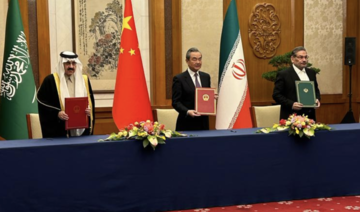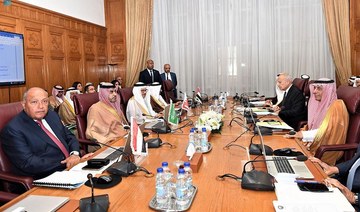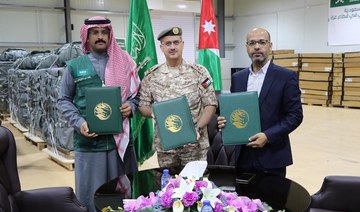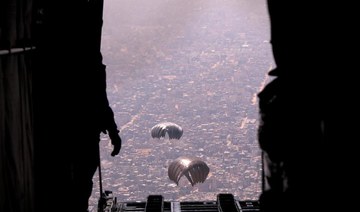RIYADH: The US said it was aware of reports that Iran and Saudi Arabia had resumed diplomatic relations on Friday, but referred further details to the Saudis, a White House National Security Council spokesperson said.
Saudi Arabia and Iran agreed to reestablish diplomatic relations and reopen their embassies within two months following years of tensions between the two countries in a China-brokered deal.
“Generally speaking, we welcome any efforts to help end the war in Yemen and de-escalate tensions in the Middle East region,” John Kirby said. “De-escalation and diplomacy together with deterrence are key pillars of the policy President Biden outlined during his visit to the region last year,” they added.
Kirby added that, while the US welcomed the deal, Washington remained “skeptical” about whether Iran would “meet their obligations.”
The UAE said on Friday it welcomed the agreement, and said it “valued” China's role in the negotiations.
“We believe in the importance of positive communication and dialogue between the countries of the region to consolidate the concept of good neighborliness,” senior government official and advisor to the UAE president Anwar Gargash said.
Qatar’s prime minister and foreign affairs minister Sheikh Mohammed bin Abdulrahman bin Jassim Al-Thani welcomed the announcement during a phone call with Saudi foreign minister Prince Faisal bin Farhan, Qatar News Agency said on Friday.
He also welcomed the reactivation of the security cooperation agreement between the two countries and the general cooperation agreement in the fields of economy, trade, investment, technology, science, culture, sports and youth.
Al-Thani further expressed Qatar's aspiration that this step “contribute to enhancing security and stability in the region, and meet the aspirations of the peoples of the two countries for the benefit of the whole region.”
Iraq and Oman also both welcomed the announcement of the resumption of relations, according to state news agencies in both countries.
Oman “welcomed the trilateral statement on resumption of diplomatic ties between Riyadh and Tehran,” a statement carried by Oman News Agency said, while Iraq welcomed “turning a new page” between Iran and Saudi Arabia, its state news agency said.
“This is a win-win for everyone and will benefit regional and global security,” Omani foreign minister Badr Albusaidi said. “We hope in the longer term there’s also potential for increasing economic benefits for all,” he added.
The Bahraini, Algerian, Turkish, Lebanese and Sudanese foreign ministries all released statements welcoming the agreement.
Bahrain said it hoped the agreement would constitute a “positive step towards resolving differences and ending all regional conflicts through dialogue and diplomatic means,” a Bahrain News Agency report said.
The Bahrainis also hoped it would “establish international relations on the basis of understanding and respect, good neighborliness and non-interference in the affairs of other countries.”
Kuwait's foreign ministry said the agreement was key to “building trust and developing friendly relations between both countries in a way that serves the interest of the region’s countries and the whole world.”
A Jordanian statement said Amman hoped that the agreement between Saudi Arabia and Iran would contribute to “preserving the sovereignty of countries and non-interference in their internal affairs.”
On Saturday Syria welcomed the agreement saying it would lead to more stability in the region.
In a statetment Syria’s Foreign Ministry welcomed the agreement, calling it an “important step that will lead to strengthening security and stability in the region.”
It added that the agreement would also lead to cooperation that would “reflect positively on the common interests of the peoples of the two countries in particular and the peoples of the region in general.”
After the Feb. 6 earthquake that hit Turkiye and Syria, killing more than 50,000 people including more than 6,000 in Syria, Saudi Arabia was one of several Arab countries that delivered aid to government-held parts of Syria.
Turkish foreign minister Mevlut Cavusoglu spoke with his counterpart Prince Faisal over the phone to commend the decision, Saudi Press Agency reported.
Pakistani foreign minister Bilawal Bhutto Zardari said his country welcomed the “accomplishment” and congratulated the leadership of Saudi Arabia and Iran.
“In a world where we're unfortunately no longer used to receiving good news, this was really really fantastic,” he said in New York.
“Internationally on a global level, regionally, the decision of the Kingdom of Saudi Arabia and the Islamic Republic of Iran to re-establish diplomatic relations and within two months to open all the embassies, I cannot underestimate the significance of this achievement,” he added.
The Gulf Cooperation Council Secretary-General Jassem Mohamed Albudaiwi said on Friday he and his organization hoped the agreement would “contribute to enhancing security and peace,” while the Arab Parliament also said it hoped it was a “step toward restoring stability to the region.”
The Muslim World League issued a statement voicing its welcoming of the agreement late on Friday.
Hussain Ibrahim Taha, Secretary-General of the Organization of Islamic Cooperation said the agreement would contribute to “strengthening the pillars of peace, security and stability in the region” and would “give a new impetus to cooperation” among the member states of the OIC, SPA said.
Taha praised Iraq, Oman, and the leadership and government of China for hosting and sponsoring the talks.
Stephane Dujarric, spokesman for the UN Secretary General, welcomed the agreement on behalf of Antonio Guterres.
“The Secretary General expressed his appreciation to the People's Republic of China for hosting these recent talks and for promoting dialogue between the two countries,” he said.
“The Secretary General also commends efforts by other countries such as the Sultanate of Oman and the Republic of Iraq in this regard, good neighborly relations between Iran and Saudi Arabia are essential for the stability of the Gulf region.
“The Secretary General reiterates his readiness to use his good officers to further advance regional dialogue and to ensure durable peace and security in the Gulf region,” he added.
The Saudi and Iranian sides also expressed their appreciation and gratitude to Iraq and Oman for hosting rounds of dialogue that took place between both sides during the years 2021-2022, Friday's statement said.
The two sides expressed their appreciation and gratitude to the leadership and government of the People’s Republic of China for hosting and sponsoring the talks, and the efforts it placed towards its success, it added.





























